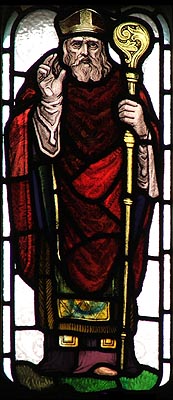
EBK Home
Kingdoms
Royalty
Saints
Pedigrees
Archaeology
King Arthur
Mail David
 St. Boisil,
Abbot of Melrose
St. Boisil,
Abbot of Melrose(Died AD 661)
Saint Boisil was a Northumbrian. As a youth, he was trained in monasticism at Lindisfarne Priory by
St. Aidan himself. He became a monk and quickly rose to be Prior of Melrose Abbey, in Tweedale, under
Abbot Eata.
Taking his information from Sigfrid, a monk of Jarrow who had trained under
Boisil, Bede tells us that the saint was a man of sublime virtues as well as an eminent scholar. The holy names of the adorable Trinity were ever on his lips and he repeated the name Jesus Christ with tender affection. He frequently exclaimed, "How good a Jesus we have!" and wept so sincerely that onlookers were encouraged to join him.
It was Boisil's evident sanctity which drew the young St.
Cuthbert to Melrose, rather than the more famous Lindisfarne, in AD 651. By chance, the prior was standing by the abbey gate when Cuthbert arrived. The latter entered the church to pray and, looking on, "Boisil had an intuition of the high degree of holiness to which the boy.....would rise, and said just this single phrase to the monks with whom he was standing: "Behold the servant of the Lord".
Abbot Eata soon gave permission for Cuthbert to enter the community, and Boisil ensured that he "watched, prayed, worked and read harder than anyone else". It was thus from the Prior that Cuthbert learned the sacred scriptures, pupil and teacher becoming great friends.
Both were given to travelling amongst the villages neighbouring Melrose and
preaching to the local people.
In AD 659, Abbot Eata left the monastery to found
a second house at Ripon in Yorkshire. Boisil became Abbot of Melrose. Two years later, Boisil was able to further demonstrate his gift of second sight when a great plague swept through the monastery. Cuthbert was stricken with the disease and
drew close to death, but Boisil correctly declared he would most certainly recover. He also predicted his own death from the same epidemic, to which he, indeed, fell victim. Shortly before the end, Boisil made his most famous prophecy, foretelling Cuthbert's rise to Episcopal glory and they great influence he would have on the Northumbrian Church.
Boisil died on 7th July AD 661 and was buried at Melrose. Miracles at his tomb soon led to him being translated to a beautifully carved shrine, parts of which are preserved in the Museum at nearby Jedburgh Abbey. Like Bede, his relics were carried off to Durham, in 1030, by the thieving priest, Alfred. He is also remembered in the name of St. Boswells in
Roxburghshire.
